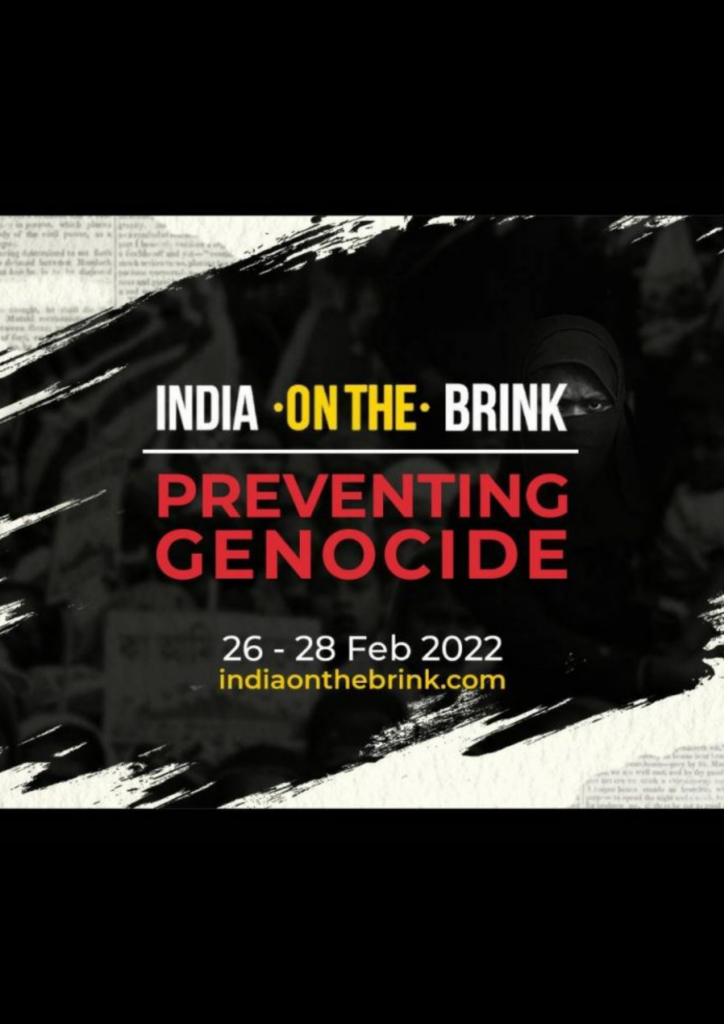First day of global summit on preventing genocide in India brings home the reality of India’s rapid descent into fascism
Washington, DC / London / The Hague / New Delhi, February 26-27, 2022
India’s 200 million Muslims are facing a dire and existential threat following genocidal calls given by powerful non-state actors closely linked with Prime Minister Narendra Modi’s Hindu supremacist government. Genocide experts, human rights defenders, scholars and journalists from around the world essentially all concurred on this assessment at a three-day virtual conference, India On The Brink: Preventing Genocide, that started on Saturday.
“India is occupied by an alien regime who does not care about its people,” said Jan Breman, a Professor at the Institute of Social Studies at the Hague. “There is a similarity between the foreign occupation [of India] and [the] current regime” of Prime Minister Modi, he added, speaking at a session titled “Gujarat: Cradle and Harbinger of Identity Politics,” which is the name of a new book he has published this year.
Prof. Breman, who has done extensive fieldwork in India’s Gujarat state, said the doctrine of Hindutva – Hindu nationalism – “excludes not only the Muslims but the laborers, Dalits, adivasis and the poor… from protection and resources.”
Prof. Breman said there were similarities between Hindutva and Adolf Hitler’s Nazi period: the idea of “superiority of genetic supremacy,” that “Hindutva is hierarchical” creating the “idea of superiority and inferiority;” and the idea of segregating “those who are considered the enemies” who are then “deported and exterminated.”
“People who have been keeping a low profile and keeping silent, increasingly are getting frustrated by the Hindutva and its inability to create income, employment, and a dignified standard of life,” Prof. Breman said.
Speaking at a panel titled “Gujarat 2002: The Beginning of Genocide,” noted human rights defender Teesta Setalvad said “hate speeches and hate crimes enabled the genocide in Gujarat” in the year 2002, where over 2,000 people, most of them Muslims, were killed. “For three months, Muslims were not allowed to go back to their villages,” she said recalling the aftermath of the mass violence that was carried out by Hindu extremists under the rule of Mr. Modi, who was Gujarat’s chief minister at that time.
She added that those who organized the religious gathering at the north Indian city of Haridwar in December 2021, where calls to kill two million Muslims were given, had been “trying to get support from right wingers right from 2017… We tried to complain but got the reply from Facebook that they can block the users.” Setalvad said social media was “amplifying the hate.”
She said civil society needed to “build a movement by journalists, activists and academics against hate speeches by analyzing these speeches.” She said there was a “lack of desire to recognize the calls for genocide.”
Veteran Indian journalist Prem Shankar Jha said India was on the brink of “losing its soul, saying that he feared that a large part of India “will break away.” He detailed his findings about a train fire in February 2002, in which nearly 60 people were killed, that was used as a pretext to launch the violence against Muslims across the state. The findings that Muslims were responsible for the train fire were utterly wrong, he said.
Former top police officer from Gujarat, R.B. Sreekumar, who, as a whistleblower, exposed Mr. Modi’s role in the 2002 violence, said he had sent an anonymous message informing India’s President of the complicity of police officers in that violence. The Rashtriya Swayamsevak Sangh (RSS) and the Vishwa Hindu Parishad (VHP), organized the violence and facilitated the crimes.
For his honesty and courage, Mr. Shreekumar was continuously hounded and persecuted even as he submitted several affidavits affirming the truth of his allegations. “I was pressured to not speak the truth.” Eventually, no action was taken, he said.
Aakashi Bhatt, a surgeon in the UK and the daughter of jailed whistleblower police officer Sanjiv Bhatt, said, “We live in a world where systematic genocide takes place and the perpetrators are scott free and continue to live freely for decades. The virtue of non-violence and tolerance burnt with Gujarat riots.”
Her father was wrongfully convicted three years ago of murdering a man he had never even met. This was actually punishment because Mr. Bhatt told India’s Supreme Court that Modi had explicitly ordered the police to stand down and let mobs kill Muslims.
“For the past twenty years my father has been paying the price for fighting for justice. It takes courage to fight a long lonely battle.”
Speaking at a panel titled “Hijab Ban, Hounding & Hate Speech: Targeting of Muslim Women in the Long Shadow of Gujarat 2002,” panelists condemned the ban on the wearing of hijab by Muslim school and college students in Karnataka.
“Muslim women have woken up in India to find their names on auctioning apps… The call to rape and kill Muslim women is routine, and efforts to dehumanize Muslim women is on the rise,” said Sabika Abbas Naqvi, a gender rights activist and poet. “Hijab is not the issue. The issue is the rising hate the Muslim women are facing.”
The Hindu right-wing “fear our ability to write, to speak, to journal, to dream, articulate, assert, organize, and fiercely fight the oppressors. They either sexualize us, try to act as our messiahs or plot to kill. But we are here to conquer the world. We are lawyers, poets, journalists, actors, activists, entrepreneurs, scholars and the only hope that our country has. Fierce and fearless in the face of hate and discrimination,” she added.
Nitasha Kaul, a professor at University of Westminster, condemned the “moral policing of women’s behavior… People must stop and think why it is necessary to be ‘othering’ the Muslims. The aim of these majoritarian projects is to perpetuate the Hindu identity of India.”
Rights activist Kavita Krishnan said the hijab had become the “latest pretext for Hindu supremacist governments and mobs to harass and attack Muslims. The same BJP leaders who are declaring that the hijab isn’t compatible with school and college uniforms, are asserting that bindi, tilak, sindoor and other displays of the Hindu faith are perfectly compatible with school uniforms,” she said.
“The aim is to mark visible signs of Muslim identity as “alien” and un-Indian: as prescribed by RSS ideologues Golwalkar and Deen Dayal Upadhyay decades before hijab-wearing was deemed “controversial” by the BJP this year in Karnataka.
“The public stripping of Muslim women on the streets of India is a foreboding of the genocide that Indian Muslims face. If this is not enough to convince you, then you don’t want to be convinced. You are complicit,” said Safoora Zargar, a prominent Muslim activist against India’s discriminatory citizenship law for which she was jailed in 2020.
“Sexual violence against women is used as a tool to humiliate a community as it was used in Gujarat pogrom. Hate speech always has a purpose and leads to these kinds of acts, brutality and harm on ground. We will never be able to leave this baggage and injustice which have destroyed us and our country,” she added.
“I was jailed for “orchestrating terrorism” because I protested. I am casually called a terrorist. Isn’t it absurd?” Ms. Zargar said.
Another anti-citizenship law protester and prominent youth leader Ayesha Renna said, “Muslim women have been continuously facing the vilification and harassment online and offline which is a display of pure Islamophobia. Everyday we wake up to new lynchings and causalities but it has been normalized to an extent that these attacks have become a customary practice. These Hindutva groups have problems with our existence itself.”
Speaking at another panel titled “Silence is Complicity: Hindu Response to Majoritarian Violence,” panelists said India’s Hindus must come forward to oppose Hindutva and support the persecuted Muslims.
Sunita Viswanath, Executive Director, Hindus for Human Rights, noted that Genocide Watch, the world’s foremost expert on genocides, had given a warning of the “early signs of genocide” of Muslims in India. “My message to Hindu Indians and Hindu diaspora is to look at it from now instead of regretting later.”
Brahmachari Atmabodhananda, a Hindu ascetic living in Hardiwar, said it was “shameful to know that the Bharatiya Janata Party that claims to be a Hindu party has jailed, sanctioned and poisoned many of the Satyagrahis (genuine Sanyasis and Sadhvis). It was shocking to know that something like the ‘Dharm Sansads’ called for a genocide took place in Haridwar. In the name of Sanyasis. They are not Sanyasis, they are Ravanas.”
Dr. Rakesh Pathak, an award-winning Hindu journalist, said even India’s freedom fighters did not use the “language of division [saying] Hindus are in danger.” But with the RSS’s emergence, the “Hindu-Muslim binary was created. RSS and its leaders are ready to achieve their agenda of Hindu Rashtra. To think that genocide cannot happen is to ignore the danger because no genocide takes place overnight but it is planned and takes place gradually.”
To tell Muslims “what to wear and eat” was a sign of the “Talibanization of our democratic country. Hindu society is not silent completely but is not vocal as much as they should have been. Particularly Hindu women should have reacted and spoken,” he said. “Hindutva’s next target will be Christians and Adivasis.”
US-based Hindu theologian Anantanand Rambachan said, “Any call for genocide must be universally called out. Such a call can not be justified on any grounds. Values that spiritually mandate us as Hindus to stand against the call of killing of our Muslim brothers: Our tradition does not approve the silence in current reality. The Hindu tradition, the Vedas and the Ramayana teach us to ‘speak the truth, not untruth.’”
India appears to be on the brink of genocide. 20 years after the Gujarat riots, the India on the Brink Summit serves to commemorate, share, and look ahead.
Please visit our website at: https://indiaonthebrink.com/



